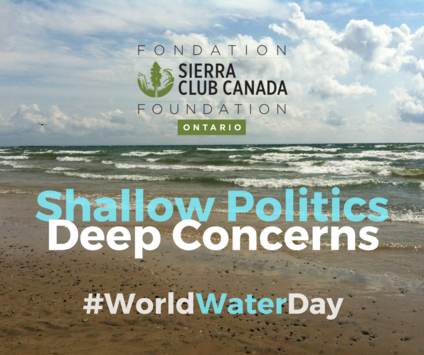
by Becky Bassick & Lino Grima
Sierra Club Canada Foundation, Ontario Chapter
Ontario's 42nd general election is scheduled for June of this year. Sierra Club Ontario (SCO) is working hard with a coalition of other environmental nonprofits to ensure that water is part of the political conversation. In addition, SCO is taking this opportunity to discuss fundamental questions regarding our election process.
Water is vital to the health of Ontario's people, ecosystems, wildlife, and economy.
- Health Essential: The Great Lakes provide nearly 80% of Ontarians with drinking water. Almost one quarter of Canadian agricultural production happens in the Great Lakes-St. Lawrence River Basin.
- Ecological Services: Wetlands are crucial in providing us with flood protection and water filtration.
- Wildlife Habitat: Over 3,500 plant and animal species call the Great Lakes region home, some of which are not found anywhere else in the world.
- Economic Bedrock: The Great Lakes Basin accounts for 40% of Canada’s gross national product, and water is vital to our economy. For example, Lake Erie's $240-million commercial fishery is one of the largest in the world. Recreational anglers alone contribute more than $600 million to Ontario's economy every year.
Through our collaborative efforts, a group of Ontario environmental nongovernmental organizations (ENGOs) drafted and submitted a letter to all political parties, outlining our concerns with regard to water issues. We have asked the four Ontario political parties to make firm commitments, with targets and timelines, to ensure accountability and transparency.
Our demands include:
- Eliminating all boil water advisories and long-standing water quality violations by 2020. Indigenous and rural communities are especially affected by long-term water advisories. Presently there are 73 advisories in Ontario, 4 of which are Do Not Consume. This is unacceptable.
- Eliminating the release of untreated sewage by 2022, and, in the meantime, providing real-time notifications to the public of sewage spills and by-passes. Most municipalities in Ontario use combined sewer systems, which collect industrial wastewater, domestic sewage, and rainwater runoff in the same pipe. During storms or snowmelt events, flows exceed the capacity of the sewers and overflow directly into nearby streams, rivers, or the Great Lakes. These are called combined sewer overflows (CSOs). As climate change causes more extreme weather, CSOs become more frequent and pose greater risks to human and ecosystem health.
- Take immediate steps to reduce phosphorus levels in near-shore areas of all the Great Lakes and reduce phosphorus levels in Lake Erie by at least 40% by 2025, preferably with a target of 20% by 2020. Excess phosphorus leads to toxic algal blooms that are harmful to humans and wildlife.
- Reduce chemical pollution from all sources. In particular, endocrine disrupting substances, which mimic and interfere with hormones, are a growing concern for human and ecosystem health.
As we consider the role of water in the upcoming election, SCO would like to take this opportunity to broaden the discussion of basic issues surrounding the election. We look forward to an early adoption of proportional representation in our electoral system, ideally the single transferable vote. Under our current system of first-past-the-post voting, most elected candidates receive less than 50% of the votes when there are three or more candidates in their constituency. This means our currently elected representatives do not have the confidence of the majority of voters.
In a single transferable voting system, voters could express their preference for candidates that reflect their priorities in the first round of counting, then pass on their preference to another candidate if their first choice does not obtain more than 50% of the total vote in their riding. Such a reform would ensure that issues like water quality are expressed, as well as electing representatives that hold the confidence of the majority of voters.
A general election is a great privilege and a significant opportunity for all of us to help elect good candidates who will foster sustainable growth and positive change in our communities. By reforming the system to reflect the desires of the majority, we can make our voices heard in the pursuit of health and environmental protection.
If you have questions, please contact us at ontariochapter@sierraclub.ca. We need your support to help keep the Great Lakes great.
